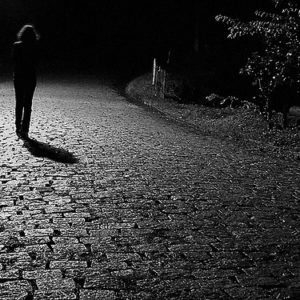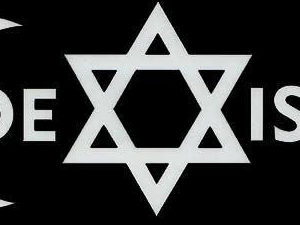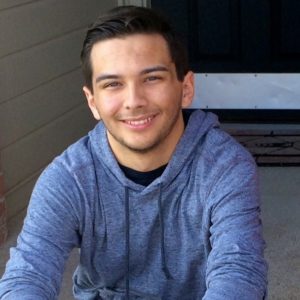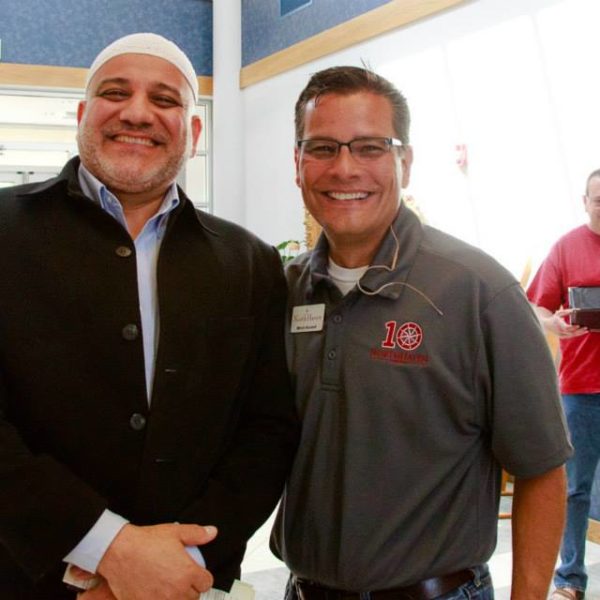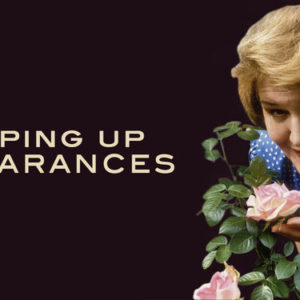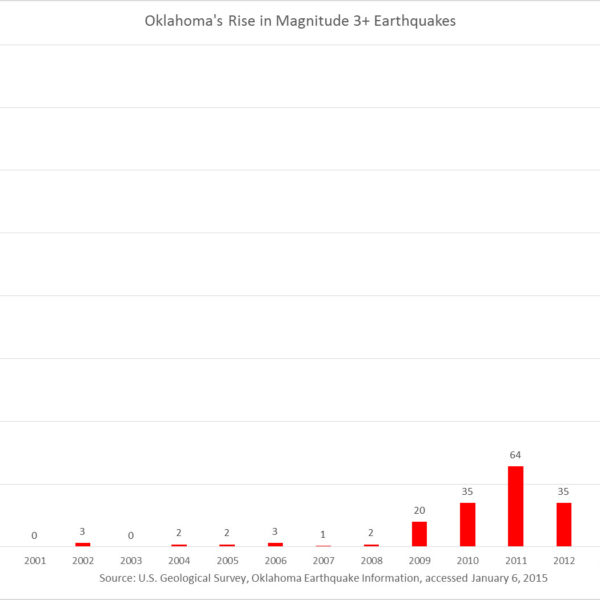Over the Labor Day weekend, I was reminded of the colossal struggle between humanity and God’s creation. On Saturday morning, Missy and I woke to our house shaking violently. Amazingly, as soon as it happened, I somehow knew exactly what was occurring. Earthquake. Since moving back to Oklahoma almost ten years ago, I find it very strange that I can immediately recognize an earthquake as soon as the earth begins to rock-and-roll. My surprise gave way to worry, however, later on in the day when I read Oklahoma earthquakes have increased 5,000% as early as two years ago. Why?
Shortly after the 5.6 earthquake startled people from Texas to Nebraska, Oklahoma state officials shut down 37 of the state’s 3,200 active disposal wells. Disposal wells are a technique used by the oil and gas industry that pushes wastewater deep underground, even deeper than where oil and gas are found. According to CNN Money, “The wastewater mostly consists of a substance called brine — a mix of water and chemicals that comes to the surface with oil and gas when they are pumped from the Earth.” In addition, “A small portion is also the water that’s pumped underground in the modern hydraulic fracturing process, a drilling technique often referred to as fracking.”
If state officials (some even hostile to those suggesting a connection between quakes and wells) immediately shut down these wells after Saturday’s quake, then what do they know that they are not telling the public? Now, I have many close friends and church members in the oil and gas industry. These are good people, working in an industry that has served the world for a number of years. Even they are now starting to question what is going on with these wells. Therefore, I think the time has come to seriously consider shutting these wells down, seek better techniques for drilling, and continue supporting the energy industry’s transformation into cleaner fuels.
Later on that Saturday morning, after I assessed there was no damage to my house, I read a story about the conflict between the Dakota Access Pipeline Energy Transfer Partners and the Standing Rock Sioux Tribe. The pipeline’s developer, Energy Transfer Partners, has invested $3.7 billion into the 1,172-mile pipeline that would carry 470,000 barrels of crude oil a day from North Dakota to Illinois. According to tribal officials, Energy Transfer Pipeline used bulldozers over the weekend to destroy burial sites, prayer sites, and culturally significant artifacts. In response, the conflict escalated, with violence breaking out between protestors and security guards.
Reading this story has sent my head spinning. First, where are local and state police during this encounter to stave off violent conflicts? Second, why are these pipelines always constructed across Native American lands and not through white-suburban neighborhoods? Third, how would anyone respond if a company came into the cemetery where your great-grandparents were buried and began to destroy it? There has to be a better way for progress to move forward without destroying the sacred culture of the indigenous people and address their ecological concerns. Unfortunately, it appears progress-for-profit is winning the day.
Both the earthquake and the pipeline stories have troubled my soul this weekend. We live in a time of unprecedented global change. Progress has come to us through lightening expansion, rapid production, and even faster consumption. Humanity’s thirst for progress brought about the Reformation, Renaissance, Industrial Revolution, Technological Revolution, and Globalization. None of these are bad per say, but our progress has developed some unintended consequences, consequences we must be honest about and willing to address. Progress has brought about greater needs for a greater number of people. Progress has, in the words of Thomas Friedman, made the world “Hot, Flat, and Crowded.”
Therefore, we need to be reminded the world is God’s creation and He has given us the responsibility to take care of it. The world does not spin around our egocentric existence, but rotates by the Spirit of God interacting with this created ecosystem that was masterfully designed and brilliantly woven. German theologian Jürgen Moltmann helps describe the problem in his book, “Ethics of Hope,”
“Yet the biosphere of the blue planet earth is our limited space for living. A human civilization that spans the world and is based on growth and consumption has long since arrived at these limits and is beginning permanently to destroy the living conditions of this living space in the earth’s organism. Year after year, animal and plant species are becoming extinct; atmospheric pollution is destroying the ozone layer and raising the climatic temperature; the polar ice caps are melting; the water level of the oceans is rising; the deserts are spreading, and storms and hurricanes are on the increase. We know all this, or we can know it, but it is as if we were paralyzed, changing neither our economic growth ideology nor our private and public way of life. We are not acting on what we know” (Moltmann, 131-132).
Moltmann continues with a very dire warning for a humanity that has been charged as caretakers of God’s creation,
“If Darwin is right and human beings and apes have a common ancestry, this means the end of the human being’s godlike position. As the Bible says, he is formed of the earth and can fulfill his specific human tasks only within the community of creation. Since we have come to realize that it is the religious-scientific anthropocentricism of modern times which has brought us to the present ecological crisis of nature and human civilization, we no longer see Darwin’s evolutionary theory as an attack on Christian anthropology, but begin to understand that the human being belongs to the same family as other living things on this fruitful earth. That is ultimately also the substance of the covenant with Noah, with which creation begins afresh after the Flood. It is a covenant ‘with you and your descendants after you, and with every living creature’ (Gen. 9.9–10). So all living creatures are God’s covenant partners and our covenant partners too” (Moltmann, 324).
One earthquake and one confrontation between an oil company and Native Americans might not seem like a lot, but over time these incidents have accumulated to reveal a severe problem that humanity must now address. From a theocentric vantage point, it appears God’s creation is at war with itself. While humanity has thought itself to be the “Big Dog on The Rock” for all this time, we might just discover that “The Rock” is stronger and more durable than we ever imagined. If threatened, the earth might just fight back (i.e., stronger earthquakes, more powerful hurricanes, flooding rains, and bone dry droughts). As a follower of Jesus, I can no longer stand silent. The time for humanity to explore alternate clean energy resources is upon us. We have the best and brightest in the energy world (this includes in the oil and gas industry as well), so for the sake of God, the Creator of us all, let’s roll up our sleeves and get to work making His planet healthy again.
